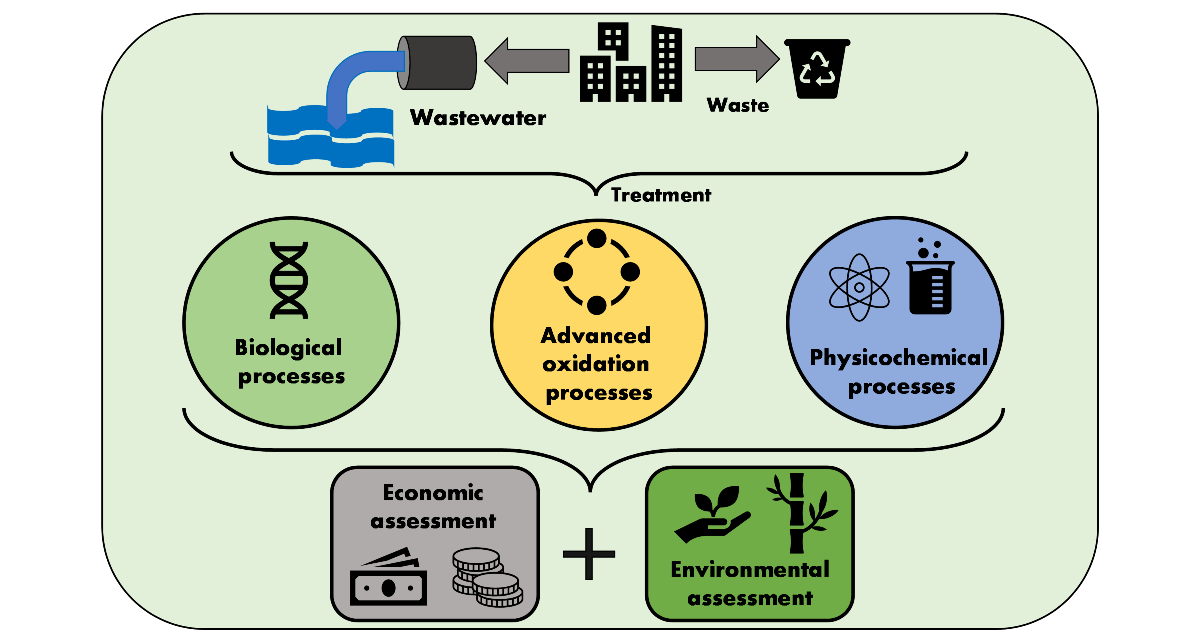Wastewater and Waste Treatment: Overview, Challenges and Current Trends (3rd Edition)
A special issue of Processes (ISSN 2227-9717). This special issue belongs to the section "Environmental and Green Processes".
Deadline for manuscript submissions: 31 May 2026 | Viewed by 3811

Special Issue Editors
Interests: membrane filtration; integrated membrane processes; adsorption; phenolic compounds; coagulation; anaerobic digestion; life cycle assessment; technoeconomic analysis; agro-industrial waste
Special Issues, Collections and Topics in MDPI journals
Interests: heterogeneous catalysis; electrochemistry; batteries and fuel cells; hydrogen; bioenergy; carbon capture and sequestration
Special Issues, Collections and Topics in MDPI journals
Special Issue Information
Dear Colleagues,
Building on the foundations of Volumes I and II, which addressed the urgent challenges of climate change and resource scarcity through innovative wastewater and waste treatment methods, this third edition aims to push the boundaries of current research and its practical applications. With growing global pressures and rapidly evolving technological landscapes, this volume will focus on integrated systems, real-world implementation, and the exploration of emerging challenges and future technologies.
The aim of this Special Issue is to explore how innovative wastewater and waste treatment approaches can be harmonized into broader systems and industry practices, and also addresses upcoming environmental challenges. By expanding the scope to include system-level thinking and disruptive technologies, this volume seeks to offer a comprehensive vision for the future of waste management.
Topics include, but are not limited to, the following:
- Integrated Systems:
- Synergies between biological, advanced oxidation, and physicochemical treatment methods.
- Development of hybrid systems for addressing complex or mixed waste streams.
- Decentralized versus centralized waste treatment approaches: opportunities and challenges.
- Emerging Challenges in Waste Treatment:
- Addressing novel pollutants, including microplastics, pharmaceuticals, and nanomaterials.
- Treatment solutions for high-salinity or otherwise extreme waste streams.
- Managing the secondary environmental impacts of treatment processes, such as greenhouse gas emissions or energy consumption.
- Future Horizons in Wastewater and Waste Management:
- The role of AI, machine learning, and big data in optimizing waste treatment processes.
- Nanotechnology applications in pollutant removal and resource recovery.
- Speculative technologies and their potential to revolutionize waste management.
- Expanding life cycle assessment frameworks to capture emerging environmental challenges.
This volume aspires to serve as a platform for cutting-edge research and discussions, fostering innovation and collaboration toward sustainable solutions. By combining the insights of Volumes I and II with new perspectives, this third edition seeks to deliver actionable strategies and visionary ideas for addressing the intertwined challenges of wastewater, waste treatment, and global sustainability.
Dr. Dimitris Zagklis
Dr. Georgios Bampos
Guest Editors
Manuscript Submission Information
Manuscripts should be submitted online at www.mdpi.com by registering and logging in to this website. Once you are registered, click here to go to the submission form. Manuscripts can be submitted until the deadline. All submissions that pass pre-check are peer-reviewed. Accepted papers will be published continuously in the journal (as soon as accepted) and will be listed together on the special issue website. Research articles, review articles as well as short communications are invited. For planned papers, a title and short abstract (about 250 words) can be sent to the Editorial Office for assessment.
Submitted manuscripts should not have been published previously, nor be under consideration for publication elsewhere (except conference proceedings papers). All manuscripts are thoroughly refereed through a single-blind peer-review process. A guide for authors and other relevant information for submission of manuscripts is available on the Instructions for Authors page. Processes is an international peer-reviewed open access semimonthly journal published by MDPI.
Please visit the Instructions for Authors page before submitting a manuscript. The Article Processing Charge (APC) for publication in this open access journal is 2400 CHF (Swiss Francs). Submitted papers should be well formatted and use good English. Authors may use MDPI's English editing service prior to publication or during author revisions.
Keywords
- integrated systems
- wastewater treatment
- resource recovery
- life cycle assessment
- technoeconomic analysis
- emerging pollutants
- policy implementation
- hybrid technologies
- nanotechnology
- sustainable waste management
Benefits of Publishing in a Special Issue
- Ease of navigation: Grouping papers by topic helps scholars navigate broad scope journals more efficiently.
- Greater discoverability: Special Issues support the reach and impact of scientific research. Articles in Special Issues are more discoverable and cited more frequently.
- Expansion of research network: Special Issues facilitate connections among authors, fostering scientific collaborations.
- External promotion: Articles in Special Issues are often promoted through the journal's social media, increasing their visibility.
- Reprint: MDPI Books provides the opportunity to republish successful Special Issues in book format, both online and in print.
Further information on MDPI's Special Issue policies can be found here.






